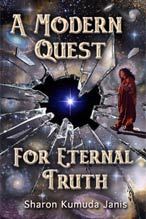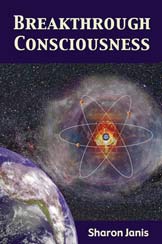
The Humility of Not Knowing
by Sharon Janis
An intriguing quote from the Indian spiritual texts declares that “He who (thinks he) knows, knows not; and he who (thinks he) knows not truly knows.”
This statement was part of an hour-long text I chanted every morning during my ten years in a monastic ashram, and it stays with me to this day. It is amazing how a single statement can remain an ever-blossoming companion through the journey of life. When I first encountered the phrase as a spiritual novice, it struck me as somewhat humorous, clearly pointing out some ironic twist of life that I had not yet figured out well enough to put into words myself.
Descartes declared a similar idea after his arduous search for absolute, unequivocal truth. All he could assert with total conviction was, “I think, therefore I am.” He realized that everything else, including our supposedly dependable physical laws, is ultimately up for grabs. For example, a “physical law” that was undeniable in our dream last night may not be so upon awakening. What if we are unknowingly in the middle of a dream right now? How can we really know?
According to ancient seers and sages, the only way to truly “know” is to transcend the knowing mind. It’s a paradox, but why shouldn’t it be? The universe is filled with paradox and intrigue, mainly due to our inability to see things as they really, ultimately are.
The surrender extolled in ancient spiritual texts doesn’t refer to giving away our power to another, but rather to surrendering our attachment to the familiar, culturally comfortable concepts our society has agreed to hold as true. It is a surrender to knowing we do not know.
It takes but a quick glance through the history books to find an abundance of bizarre, even ridiculous ideas once held as gospel by our ancestors. For example, I was born right around the time society finally agreed to admit that there is not any substantial difference between human beings based on the color of their skin. During the years before this time, people with dark skin could not drink out of the same water fountains as people with white skins. Can you imagine? Yet, people we encounter every day lived during a time when this was considered appropriate. Some of the nice folks we know may have even chased a thirsty black child away from the “whites only” fountain back when that was considered acceptable.
A couple hundred years ago, our great great great, not-always-so-great grandfathers were actually burning women alive if they appeared to show any kind of magical “witch” powers. Today, the same people that would have been burned are flourishing on the New York Times bestseller list.
The waves of life, learning and ignorance, continue to unfold and dissolve throughout the ages, with old wisdom forgotten, new wisdom discovered; each generation and culture living in their own limited set of conceptions and misconceptions. This is why it is so important to attain the humility of not knowing.
Resting in the state of knowing we don’t know opens us to learning and imagining other possibilities instead of spending our energy trying to keep current worldviews intact. Instead of racking up more knowledge and facts about each field of worldly study, we can begin to tap into a different kind of knowing, a wisdom that flows within our hearts like an ever fresh spring, guiding our steps from its realm beyond the part of our mind that thinks it knows, but does not.
I said to my soul, be still, and wait without hope
For hope would be hope for the wrong thing; wait without love
For love would be love of the wrong thing; there is yet faith
But the faith and the love and the hope are all in the waiting.
Wait without thought, for you are not ready for thought:
So the darkness shall be the light, and the stillness the dancing.— T.S. Eliot
This humility of not knowing gives a freedom to explore different levels and layers of reality, with the innocence necessary for true learning. Our commitment stays focused on the Truth, rather than in propagating a particular point of view. In this state of not knowing, there is even room for paradox and contradictory worldviews. We can move into the space called “witness consciousness” and from there appreciate the truly amazing and multidimensional nature of this magnificent universe.
Enjoy Additional Works by Sharon Janis as part of the
Night Lotus Offering of Multimedia Spiritual ResourcesClick on a book or CD cover to enjoy it online
Home Page | Contact | Site Map | Books | YouTube Channel | Spiritual Commentary Blog | Secrets of Spiritual Happiness | Links | Chanting and Devotional Singing | Inspiring Videos | Sanskrit Spiritual Scriptures | Nityananda | Workshops | Photographs | Kirtan Chanting | Chai | Sacred Music Concerts | About the Artist | Disclaimer | About Night Lotus | Purchasing Our Works | Gifts for You
















